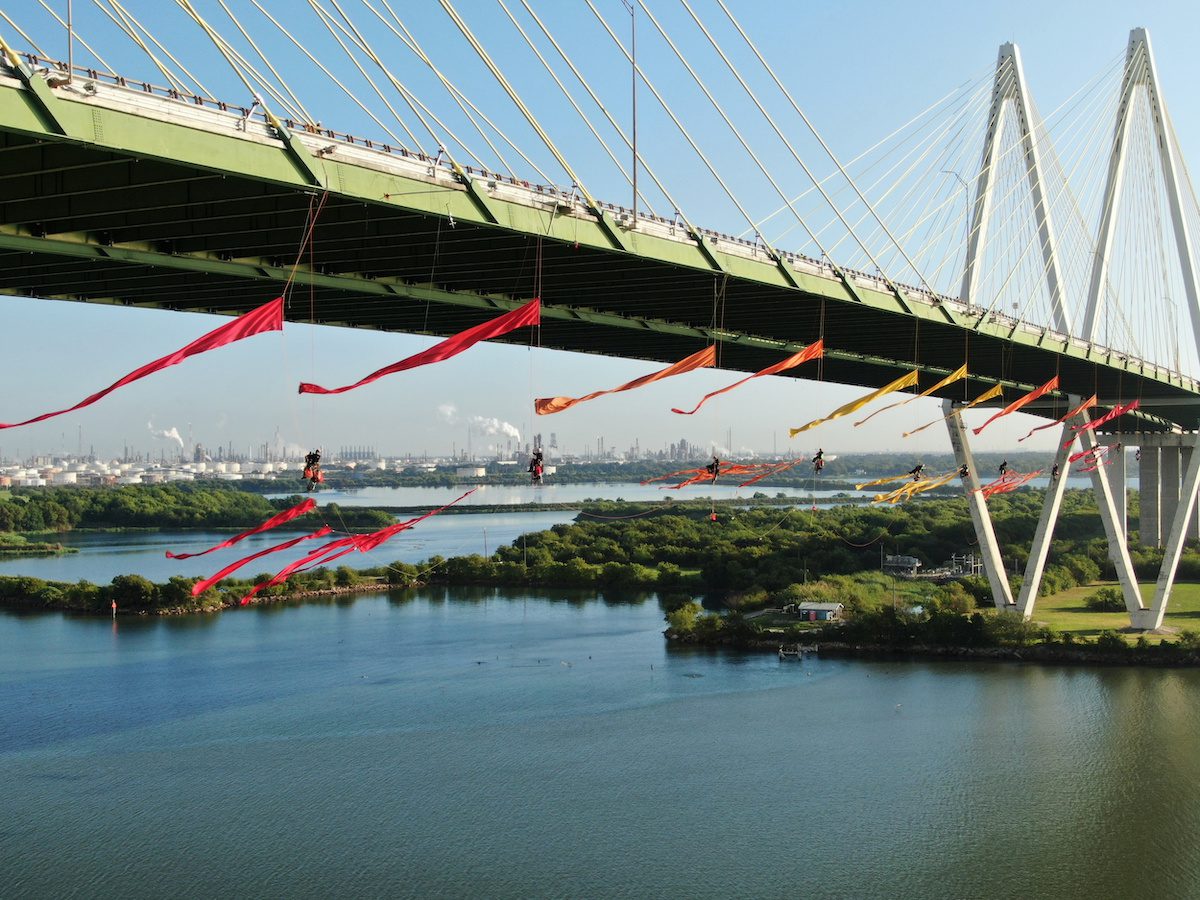Greenpeace USA climbers form a blockade on the Fred Hartman Bridge, shutting down the Houston Ship Channel, the largest fossil fuel thoroughfare in the United States, ahead of the third Democratic primary debate in nearby Houston, near Baytown, Texas, U.S. September 12, 2019. ©Anonymous/Greenpeace USA/HANDOUT VIA REUTERS
By Simon Casey and Barbara Powell (Bloomberg) –More than a dozen Greenpeace activists were arrested Thursday after partially shutting the Houston Ship Channel by suspending themselves from a bridge spanning the key oil route in protest against the fossil fuel industry.
The section of the channel between Baytown and Spilmans Island was closed, according to the Coast Guard’s Vessel Traffic Center, which said it couldn’t identify the people involved. In an email and across social media, Greenpeace claimed responsibility, and said it was taking the action ahead of Thursday night’s Democratic presidential primary debate in Houston.
“We’re in a climate emergency created by fossil fuel CEOs and made worse by Trump,” Greenpeace USA Executive Director Annie Leonard said in an email. “We can either take bold action to combat the climate crisis today or suffer the consequence — more floods, more mega-storms, and more fires — for years to come.”
About an hour before the Democratic debate was set to begin in Houston, 15 activists had been taken into custody, according to a statement from Greenpeace.
The action is the latest in a string of protests targeting the oil industry. The group put up barriers at entrances to BP Plc’s London headquarters in May while demanding the company either end its investments in oil and natural gas and become a renewable-energy firm or completely wind down its operations.
In April, activists from Extinction Rebellion glued themselves to trains, blockaded parts of London and vandalized Royal Dutch Shell Plc’s U.K. headquarters. Climate-change protesters glued their hands to the doors of a conference venue during IP Week in February, London’s biggest gathering of oil traders and producers.
In the U.S., pipelines — such as the Dakota Access project — have become a focus of protests in recent years. Legislation that criminalizes trespassing near oil pipelines, gas-processing equipment and other infrastructure designated as critical passed this year in Indiana, North Dakota, South Dakota, Tennessee and Texas — building on similar measures previously enacted in Oklahoma and other states.
The Houston Ship Channel is frequently closed because of fog. It was shut in March after a chemical spill cause by a fire at a storage complex. This is the first time Greenpeace has targeted the channel, according to its spokesman Ryan Schleeter.
The channel is one of the busiest commercial shipping routes in North America, connecting the city’s manufacturing and oil-refining nexus to Galveston Bay and the Gulf of Mexico. The waterway supports roughly 12% of U.S. oil refining. On a normal day, 42 tankers, 19 freighters, 391 barges, 128 ferries and 2 cruise ships will move through the channel.
Traffic was suspended about 6:30 a.m. local time after the Coast Guard learned that 11 people had suspended themselves from the Fred Hartman Bridge, Petty Officer Second Class Johanna Strickland said in a phone interview. The section closed is about half a nautical mile, from Light 102A to 104A.
The channel has three vessels inbound and three outbound in a queue, according to the Coast Guard’s Lt. Adam Horstick.
© 2019 Bloomberg L.P

 Join The Club
Join The Club











